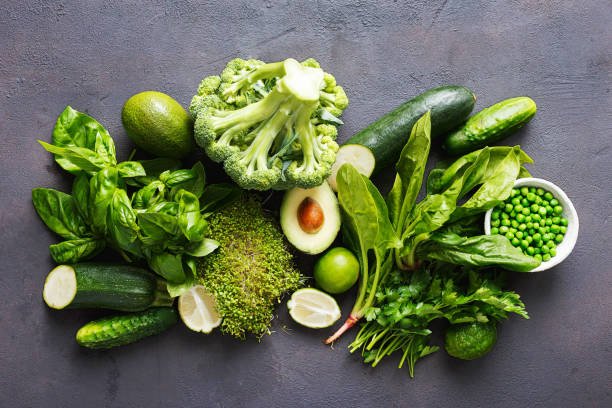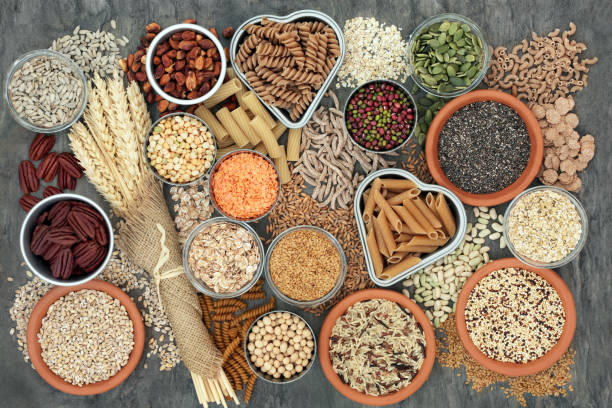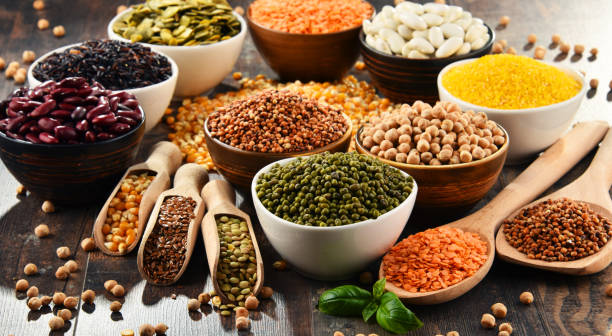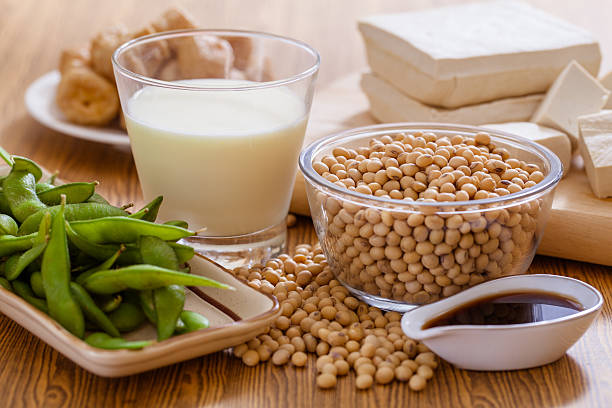
Healthy eating is crucial for maintaining overall well-being and preventing chronic diseases. The top 10 healthiest foods were selected based on their nutrient density, health benefits, and supporting research. These foods are packed with essential vitamins, minerals, and other nutrients that promote optimal health.
Food No 1. Dark Green Vegetables
Examples: Spinach, kale, broccoli
Nutritional benefits: High in vitamins A, C, K, and minerals like iron and calcium
Health benefits: Dark green vegetables are powerhouses of nutrition. Spinach, kale, and broccoli are excellent sources of essential vitamins and minerals. Vitamin A is crucial for vision and immune function, while vitamin K is essential for blood clotting and bone health. Iron is necessary for the formation of hemoglobin, which carries oxygen in the blood, and calcium is vital for bone health.
These vegetables also contain antioxidants that protect against cellular damage and reduce inflammation, which is a risk factor for many chronic diseases, including heart disease and certain cancers. Studies have shown that a diet rich in dark green vegetables is associated with a lower risk of several types of cancer, improved heart health, and better bone health.

Food No 2. Berries
Examples: Blueberries, strawberries, raspberries
Nutritional benefits: Rich in antioxidants, vitamins C and K, fiber
Health benefits: Berries are not only delicious but also incredibly nutritious. They are packed with antioxidants, which help protect cells from damage caused by free radicals. Free radicals can contribute to aging and diseases like cancer. The high vitamin C content in berries supports immune function and skin health, while vitamin K is important for bone health.
Fiber helps maintain digestive health and supports heart health by lowering cholesterol levels. Research indicates that regular consumption of berries can improve heart health, enhance brain function, and provide anti-aging benefits. For example, blueberries have been shown to improve memory and cognitive function in older adults.

Food No 3. Fish
Examples: Salmon, mackerel, sardines
Nutritional benefits: High in omega-3 fatty acids, protein, and vitamin D
Health benefits: Fish, particularly fatty fish like salmon, mackerel, and sardines, are among the best sources of omega-3 fatty acids. These healthy fats are essential for brain health and can reduce inflammation in the body. Omega-3 fatty acids have been linked to a lower risk of heart disease, improved brain function, and better joint health.
Fish is also a great source of high-quality protein, which is necessary for muscle repair and growth, and vitamin D, which supports bone health and immune function. Regular consumption of fish can reduce the risk of chronic diseases, including heart disease and stroke. Studies have also shown that omega-3 fatty acids can help reduce symptoms of depression and anxiety.

Food No 4. Nuts
Examples: Almonds, walnuts, pistachios
Nutritional benefits: High in healthy fats, protein, vitamins E and B6
Health benefits: Nuts are nutritional powerhouses that provide a variety of health benefits. They are rich in healthy fats, particularly monounsaturated and polyunsaturated fats, which support heart health by lowering bad cholesterol levels. Nuts also provide protein, making them a good snack for maintaining energy levels and promoting muscle health.
Vitamin E in nuts acts as an antioxidant, protecting cells from damage, and vitamin B6 is essential for brain health and the production of neurotransmitters. Regular consumption of nuts is associated with a reduced risk of heart disease, lower cholesterol levels, and better weight management. Walnuts, in particular, are high in alpha-linolenic acid (ALA), a type of omega-3 fatty acid that has anti-inflammatory properties.

Food No 5. Whole Grains
Examples: Quinoa, brown rice, oats
Nutritional benefits: Rich in fiber, B vitamins, iron, and magnesium
Health benefits: Whole grains are an important part of a healthy diet. They provide essential nutrients, including fiber, which aids in digestion and helps maintain healthy blood sugar levels. B vitamins, found in whole grains, play a crucial role in energy production and brain function. Iron is necessary for carrying oxygen in the blood, and magnesium is involved in over 300 biochemical reactions in the body, including muscle and nerve function.
Whole grains have been shown to reduce the risk of chronic diseases, such as heart disease, type 2 diabetes, and certain cancers. They also promote digestive health and can help with weight management by providing a feeling of fullness. Quinoa is particularly noteworthy because it is a complete protein, meaning it contains all nine essential amino acids.

Food No 6. Beans and Lentils
Nutritional benefits: High in protein, fiber, iron, and folate
Health benefits: Beans and lentils are excellent plant-based sources of protein and fiber. Protein is essential for building and repairing tissues, while fiber aids in digestion and helps control blood sugar levels. Iron in beans and lentils supports the production of hemoglobin, and folate is crucial for DNA synthesis and cell division.
These legumes are also low in fat and have a low glycemic index, making them a good choice for people with diabetes. Regular consumption of beans and lentils is associated with a reduced risk of heart disease, better blood sugar control, and improved digestive health. They also provide a good source of antioxidants, which help reduce inflammation and protect against chronic diseases.

Food No 7. Eggs
Nutritional benefits: High in protein, vitamins B12, D, and choline
Health benefits: Eggs are one of the most nutrient-dense foods available. They are an excellent source of high-quality protein, which is essential for muscle building and repair. Eggs also provide vitamins B12 and D, which are important for energy production and bone health, respectively.
Choline, found in eggs, supports brain health and is necessary for the production of acetylcholine, a neurotransmitter involved in memory and muscle function. Despite their cholesterol content, research has shown that moderate egg consumption does not increase the risk of heart disease in healthy individuals. In fact, eggs can be part of a heart-healthy diet by providing essential nutrients and promoting satiety.

Food No 8. Soy
Examples: Tofu, edamame, tempeh
Nutritional benefits: High in protein, iron, calcium, and phytoestrogens
Health benefits: Soy products are a great source of plant-based protein, making them an excellent option for vegetarians and vegans. They are also rich in iron and calcium, which are essential for blood and bone health. Phytoestrogens, found in soy, have been shown to have a beneficial effect on heart health and may help reduce the risk of certain cancers.
Soy products, such as tofu, edamame, and tempeh, can help lower cholesterol levels, improve bone health, and provide a complete protein source. Research has indicated that regular consumption of soy can reduce the risk of heart disease and improve overall health outcomes .

Food No 9. Water
Nutritional benefits: Essential for all bodily functions
Health benefits: Water is the most essential nutrient for the human body. It is necessary for maintaining hydration, supporting kidney function, and aiding digestion. Water helps regulate body temperature, lubricates joints, and transports nutrients and oxygen to cells.
Staying well-hydrated is crucial for overall health, as even mild dehydration can impair physical and cognitive performance. Drinking enough water can help prevent kidney stones, support weight management, and improve skin health. It is recommended to drink at least eight 8-ounce glasses of water a day, but individual needs may vary based on activity level, climate, and overall health.

Food No 10. Winter Squash
Examples: Butternut squash, acorn squash
Nutritional benefits: High in vitamins A and C, fiber, and antioxidants
Health benefits: Winter squash, such as butternut and acorn squash, is rich in vitamins A and C, which support immune function and skin health. The fiber content in winter squash promotes digestive health and helps maintain healthy blood sugar levels. Antioxidants in squash protect against cellular damage and reduce inflammation.
These vegetables are also low in calories, making them a healthy addition to a balanced diet. Regular consumption of winter squash can support eye health, boost the immune system, and reduce the risk of chronic diseases. They are versatile and can be used in a variety of dishes, from soups to roasted vegetables.

Conclusion
Incorporating these top 10 healthiest foods into your daily diet can provide numerous health benefits. They offer essential nutrients that support overall well-being and help prevent chronic diseases. A balanced and varied diet, rich in these foods, is key to maintaining good health. By making these nutritious choices, you can enhance your health and enjoy the benefits of a well-rounded diet.
Share this |
FAQs About Top 10 Best Healthiest Foods
Dark green vegetables include spinach, kale, and broccoli, among others. They are rich in vitamins A, C, K, and minerals like iron and calcium.
Berries, such as blueberries and strawberries, are rich in antioxidants, vitamins C and K, and fiber.
Fish like salmon and mackerel are high in omega-3 fatty acids, protein, and vitamin D, which are beneficial for heart and brain health.
Nuts like almonds and walnuts provide healthy fats, protein, vitamins E and B6, and are linked to reduced risk of heart disease.
Whole grains such as quinoa and oats are rich in fiber, B vitamins, iron, and magnesium, promoting heart health and digestion.
Beans and lentils are high in protein, fiber, iron, and folate, supporting heart health and blood sugar control.
Eggs are high in protein, vitamins B12, D, and choline, essential for muscle, bone, and brain health.
Soy products like tofu and tempeh are rich in protein, iron, calcium, and phytoestrogens, beneficial for heart and bone health.
Water is vital for hydration, kidney function, digestion, and overall bodily functions.
Winter squash such as butternut squash is high in vitamins A and C, fiber, and antioxidants, supporting immune function and digestion.
